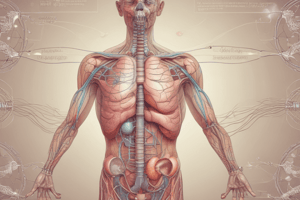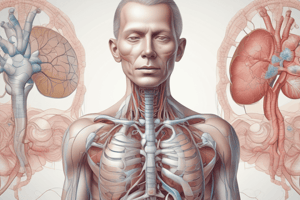Podcast
Questions and Answers
What is the third function of the respiratory system, besides bringing oxygen in and removing carbon dioxide?
What is the third function of the respiratory system, besides bringing oxygen in and removing carbon dioxide?
Regulating pH levels by removing excess hydrogen ions
Flashcards are hidden until you start studying
Study Notes
Overview
The respiratory system is a complex biological system that brings oxygen into the body and removes carbon dioxide. It is essential for the survival of all living organisms.
Functions
- Bringing oxygen into the body
- Removing carbon dioxide from the body
- Regulating pH levels by removing excess hydrogen ions
- Filtering the air we breathe
- Warming, humidifying, and cleaning the air we breathe
Organs and Components
- Nose and Mouth: Entrance points for air into the respiratory system
- Trachea (Windpipe): Tube that connects the nose and mouth to the lungs
- Bronchi: Tubes that branch off from the trachea, one for each lung
- Bronchioles: Smaller tubes that branch off from the bronchi, leading to the alveoli
- Alveoli: Small sacs where gas exchange occurs (oxygen in, carbon dioxide out)
- Lungs: Organs responsible for exchanging oxygen and carbon dioxide
- Diaphragm: Dome-shaped muscle that separates the chest cavity from the abdominal cavity, helping to expand and deflate the lungs
- Rib Cage: Provides protection for the lungs and helps with breathing
Breathing Process
- Inhalation:
- Diaphragm contracts, increasing chest cavity volume
- Air enters the nose or mouth, passing through the trachea, bronchi, and bronchioles
- Air enters the alveoli, where oxygen is absorbed into the bloodstream
- Exhalation:
- Diaphragm relaxes, decreasing chest cavity volume
- Air is pushed out of the alveoli, through the bronchioles, bronchi, trachea, and out of the nose or mouth
Gas Exchange
- Oxygen: Enters the bloodstream in the alveoli, binds to hemoglobin in red blood cells
- Carbon Dioxide: Removed from the bloodstream in the alveoli, exhaled out of the body
Respiratory System Overview
- The respiratory system brings oxygen into the body and removes carbon dioxide, making it essential for the survival of all living organisms.
Functions of the Respiratory System
- Brings oxygen into the body
- Removes carbon dioxide from the body
- Regulates pH levels by removing excess hydrogen ions
- Filters the air we breathe
- Warms, humidifies, and cleans the air we breathe
Organs and Components of the Respiratory System
- Nose and Mouth: Entrance points for air into the respiratory system
- Trachea (Windpipe): Tube that connects the nose and mouth to the lungs
- Bronchi: Tubes that branch off from the trachea, one for each lung
- Bronchioles: Smaller tubes that branch off from the bronchi, leading to the alveoli
- Alveoli: Small sacs where gas exchange occurs (oxygen in, carbon dioxide out)
- Lungs: Organs responsible for exchanging oxygen and carbon dioxide
- Diaphragm: Dome-shaped muscle that separates the chest cavity from the abdominal cavity, helping to expand and deflate the lungs
- Rib Cage: Provides protection for the lungs and helps with breathing
Breathing Process
- Inhalation: Diaphragm contracts, increasing chest cavity volume, allowing air to enter the nose or mouth, passing through the trachea, bronchi, and bronchioles, and into the alveoli, where oxygen is absorbed into the bloodstream
- Exhalation: Diaphragm relaxes, decreasing chest cavity volume, pushing air out of the alveoli, through the bronchioles, bronchi, trachea, and out of the nose or mouth
Gas Exchange
- Oxygen: Enters the bloodstream in the alveoli, binding to hemoglobin in red blood cells
- Carbon Dioxide: Removed from the bloodstream in the alveoli, exhaled out of the body
Studying That Suits You
Use AI to generate personalized quizzes and flashcards to suit your learning preferences.


